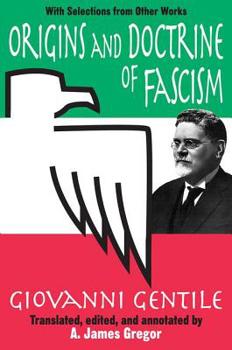Origins and Doctrine of Fascism: With Selections from Other Works
Select Format
Select Condition 
Book Overview
Giovanni Gentile (1875-1944) was the major theorist of Italian fascism, supplying its justifi cation and rationale as a developmental form of dictatorship for status-deprived nations languishing on the margins of the Great Powers. Gentile's "actualism" (as his philosophy came to be called) absorbed many intellectual currents of the early twentieth century, including nationalism, syndicalism, and futurism. He called the individual to an idealistic ethic of obedience, work, self-sacrifi ce, and national community in a dynamic rebellion against the perceived impostures of imperialism. This volume makes available some of his more signifi cant writings produced shortly before and after the Fascist accession to power in Italy.
Format:Paperback
Language:English
ISBN:0765805774
ISBN13:9780765805775
Release Date:February 2004
Publisher:Routledge
Length:122 Pages
Weight:0.45 lbs.
Dimensions:0.3" x 6.6" x 8.9"
Customer Reviews
1 rating
An Important text for the study of (one aspect of) Fascism
Published by Thriftbooks.com User , 18 years ago
This book contains Giovanni Gentile's programmatic essay "Origins and Doctrine of Fascism" as well as excerpts from other works and a short introduction by the editor, A.J. Gregor. Entitled by Mussolini himself as "the Philosopher of Fascism", Gentile is highly important to the study of Fascism, especially if you are interested in Fascist ideological theory rather than political practice (though Gentile served also as the Italian minister of education). Although the "Origins and Doctrine" is meant to be a popular essay, it is reflects the thought of a philosopher. The literature on Fascism today is mostly very judgmental - against Fascism. This, of course, is legitimate, but if you want to truly understand it, you have no other choice but turn to the original writings of the fascist thinkers themselves. In this respect, the very publication of their writings in English is a great contribution to such an understanding, especially for people (like myself) who do not read Italian. Fascist philosophy was based on two different sources: On the one hand there is the conservative 19th century Hegelian philosophy, and on the other hand there are the post-romantic challenges of the late 19th century philosophies, that challenged the moral conventions of the European civilization. The latter were influenced by thinkers like Nietzsche, Sorel and maybe Bergson. (I know that today they try to present Nietzsche as a proto-existentialist, but if you read him literally you see that to a great extent he also was a proto-fascist). While it is the second trend that makes Fascism an intriguing challenge even to our day, Gentile is clearly a representative of the first one. He keeps trying to convince the reader that Fascism is the true continuation on the classical Italian liberal Nationalism of Mazzini. I will give an example: Gentile does not criticize Freedom face to face, as some of the radicals did, but adopts the good old Platonic concept of "true freedom", stating that Man actually attains his freedom through the restricting of freedom. Actually, in this case Gentile shares the common modernist values with the liberals and the socialists, but differs on the ways to achieve them. As Gregor notes in his introduction, democrats often treat the Marxists as partners who shared the same values with them but betrayed them; they never treat Fascists in the same way, because they conceive them as brutes who never shared the same values. (I don't know to whom he was referring, but S. Zizek wrote it explicitly). Gregor says that Gentile shows that this treatment has been based on a misconception of Fascist theory. While he is wrong in respect to the second trend, he is right in respect to the first one, and certainly in respect to Gentile. I would give this book 5 stars, but I gave it only 4 for two main reasons: (a) As I said, Gentile is not the most intriguing fascist author; (b) the price is unreasonable: a paperback booklet of about 100 pages, and they demand abo






